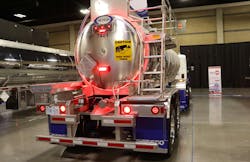The Federal Motor Carrier Safety Administration recently granted two more parts and accessories exemptions for Intellistop’s pulsating brake lamp module to Casey’s Services Company and Coffeyville Resources Crude Transportation, bringing the total number of carriers with Intellistop exemptions to eight.
Casey’s submitted its request in July 2024 and FMCSA published it in the Federal Register on Oct. 22.
The Department of Transportation agency finally granted the exemption April 16.
“They kept telling me the holdup to getting it passed through was the change in administration,” Keith Lamfers, Casey’s transportation and distribution manager, and the Midwest region chair for National Tank Truck Carriers’ Safety and Security Council, told Bulk Transporter during the 2025 NTTC Annual Conference in Tampa, Florida. “I’d anticipated receiving it two or three months earlier.
“Still, it’s definitely a good outcome for us.”
See also: FMCSA posts 10th Intellistop exemption application
The Intellistop module is designed to pulse the required rear clearance, identification, and brake lamps from a lower-level lighting intensity to a higher-level lighting intensity four times in 2 seconds when the brakes are applied and then return the lights to a steady-burning state while the brakes remain engaged. The agency determined that granting the exemption “would likely achieve a level of safety equivalent to, or greater than, the level of safety achieved by the regulation.”
The latest temporary exemptions to section 393.25(e), and temporary limited exemptions to the requirements of 49 CFR 393.11(a) and 393.25(c), runs through April 16, 2030. All other FMVSS No. 108 requirements cross-referenced or incorporated within the FMCSRs remain in effect, the agency determined.
“I am truly grateful when FMCSA approves exemptions for carriers to utilize Intellistop, allowing two more companies to enhance safety and save lives on our roadways,” Intellistop CEO Michelle Hanby told Bulk Transporter. “However, my frustration stems from the cumbersome process within the DOT. NHTSA has conducted over two decades of extensive studies on pulsating or flashing brake lights, consistently demonstrating these technologies significantly improve reaction times and reduce accidents. Taxpayer dollars fund these crucial studies, yet the public sees little benefit, as NHTSA continues to withhold this valuable information.
See also: FMCSA publishes Casey’s exemption request
“Meanwhile, FMCSA has spent five years researching the effects of these brake light technologies and has begun granting exemptions based on substantial data. Unfortunately, NHTSA’s overreach has created unnecessary obstacles that impede progress.
“This is precisely why organizations like DOGE are essential. With 25 years of combined research and an investment exceeding $10 million, we’ve solidified the effectiveness of pulsing brake lights. The initial six exemptions for Intellistop took over a year and a half to secure, with the Casey’s exemption request submitted last summer, published in the federal register in late October 2024, and only now approved. Coffeyville Resources faced a similar delay.”
Hanby also recently re-petitioned FMCSA, asking the agency reconsider its denial of Intellistop’s request to exempt all interstate carriers from the 393.25(e) requirement that all commercial motor vehicles, including flatbed trailers and straight trucks, must be equipped with “steady-burning” brake lamps. FMCSA denied Intellistop’s broader application Oct. 7, 2022, in a long-delayed decision. Hanby sent the petition and a letter of support from Luke Loy, a recently retired FMCSA senior engineer, to DOT Secretary Sean Duffy, the Department of Government Efficiency (DOGE), and the Office of Inspector General.
See also: Gemini wins first Intellistop exemption
“It is evident this process needs streamlining,” Hanby concluded. “Government inefficiency cannot continue to obstruct advancements in roadway safety. FMCSA must grant a blanket exemption for all carriers to use Intellistop, eliminating unnecessary delays and instead focusing on saving lives and reducing accidents.
“We owe it to the public to act decisively and efficiently for their safety.”
Casey’s and Coffeyville now face the same installation limitations and reporting requirements as previously exempted fleets.
“The applicant may not install the Intellistop module on more than 25% of its power units and 25% of its trailers during the first year of operation under the exemption, or on more than 50% of its power units and 50% of its trailers during the second year,” FMCSA said. “The applicant must provide the agency the vehicle identification numbers for the power units and trailers that will be operating under the exemption.
“The applicant must maintain a control group of equal size to the group of power units and trailers equipped with the Intellistop unit during the first year of the exemption. And the CMVs in the control group must operate on routes with schedules that are similar to those of the Intellistop-equipped vehicles.”
About the Author
Jason McDaniel
Jason McDaniel, based in the Houston TX area, has more than 20 years of experience as an award-winning journalist. He spent 15 writing and editing for daily newspapers, including the Houston Chronicle, and began covering the commercial vehicle industry in 2018. He was named editor of Bulk Transporter and Refrigerated Transporter magazines in July 2020.


